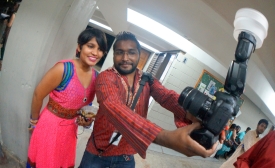india

How non-state actors have the potential to further Indian public diplomacy.
The India-Pakistan conflict has sadly spilled into the cultural realm, attenuating forces that provide the little glimmer of hope for an integrated, peaceful and prosperous South Asia: culture, arts, music, movies, and people-to-people relations. Art and culture have no nation, no boundaries, and no religion. Works of art are priceless treasures of the world regardless of where they originate.
Singapore is taking the lead in the war against cybercrime by building alliances regionally and globally. [...] Singapore has been deploying 'cyber diplomacy' - building alliances with other countries [...] Singapore's Cyber Security Agency (CSA) has signed bilateral cyber agreements with five countries: France, the UK, India, the Netherlands and the US.
Cultural diplomacy is accepted as a powerful instrument of soft power whose outreach is often underestimated. It has been found to be the most effective way of influencing foreign audiences. Other countries reach out to the youth, non-elite and other audiences outside the traditional embassy circuit because this form of diplomacy derives its credibility when it is seen as being independent of government institutions.
For their 2016 Best Countries report, Reibstein and his associates surveyed 16,200 business experts and ‘informed elites’ around the world and divided their findings into nine sub-rankings like adventure, quality of life, open for business, heritage, and cultural influence. India came in at No. 22 among 60 nations.
In this scenario, India has to gradually induce China into accepting the fact that not taking action against Pakistan-based terrorism is detrimental for everyone in the neighbourhood. And this can be achieved through greater dialogue and boosting bilateral economic cooperation to an extent that will dwarf the China-Pakistan economic relationship.
[W]hen Cohen returned to Israel, he set to work. He met for coffee with a couple of other IDF officers, Yair Atias, 27, and Boaz Malkieli, 27, and they discussed the idea of using the thousands of Israelis going to Third World countries each year to show the world the IDF soldiers they don’t necessarily see on their television screens “live, from Gaza.” “The idea was to use the backpackers as the infrastructure for people to do ‘blue-and-white’ humanitarian work to show the real Israel to the world,” he said.
Afghanistan has a lot to offer to students from India and the cultural exchange between the two countries has been strengthened by the presence of 16,000 Afghan students in the country, said Ambassador, Islamic Republic of Afghanistan to India, Shaida Mohammad Abdali.







